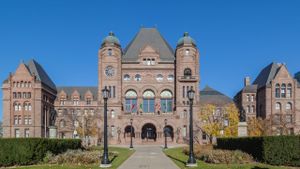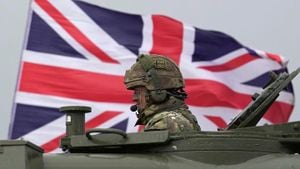US and Russia officials recently convened to discuss ways to advance negotiations, particularly focusing on the situation in Ukraine. High-level talks took place on February 18 at the historical Diriyah Palace in Riyadh, Saudi Arabia, led by US Secretary of State Marco Rubio and Russian Foreign Minister Sergey Lavrov. The discussions were pivotal, centering around four key agreements aimed at re-establishing diplomatic relations and effectively tackling the Ukraine conflict.
The first agreement involved the reinstatement of operational missions for their respective diplomatic delegations located in Washington D.C. and Moscow to guarantee normal diplomatic functions. This step was deemed necessary to facilitate constructive dialogue amid rising tensions.
Secondly, both sides agreed to designate senior officials tasked with supporting negotiations aimed at resolving the conflict in Ukraine sustainably. Ensuring long-term effectiveness of these talks would require consensus from all involved parties, which suggests a significant shift toward collaborative crisis management.
A third point of agreement initiated discussions about potential geopolitical and economic collaboration post-conflict. Secretary Rubio remarked on the unique opportunities for cooperation between the US and Russia should the war conclude, expressing optimism about future joint efforts.
The fourth key outcome from the Riyadh meeting was the commitment of the five chief negotiators who participated—Rubio, Lavrov, US National Security Advisor Mike Waltz, Russian ambassador Yuri Ushakov, and other senior officials—to continue unlocking diplomatic channels to improve international relations.
Following the negotiations, Lavrov made clear Russia’s position against Ukraine’s NATO membership, reiteratively framing it as a direct threat to Russian national interests. He remarked, “The expansion of NATO, with Ukraine joining, constitutes a direct threat to the territorial integrity and sovereignty of Russia.” This stance underlines the broader geopolitical stakes at play and Russia's reluctance to yield strategic influence over Ukraine.
The potential meeting between Presidents Donald Trump and Vladimir Putin remains tentative. Ushakov stated there is as yet no scheduled date for this meeting, emphasizing, “There’s much work still to be done.” The implication is clear: both nations have significant hurdles to clear before substantive high-level discussions can commence.
Adding to the dialogue, Trump suggested it may be necessary for Ukraine to hold elections as part of any resolution. He stated, “The leader of Ukraine, I don’t want to say it, but his approval rating is at 4%. And when they talk about having a place at the negotiation table, I think the people of Ukraine need to have a voice.” His comments highlight the internal political dynamics at play, as Ukraine faces pressure to establish legitimacy before entering agreements with Russia.
President Volodymyr Zelensky of Ukraine reacted to the conversations between US and Russian officials, asserting any peace agreement must include European participation to be considered legitimate. He emphasized the need for fair negotiations, critiquing the absence of Ukraine from the talks: “There are negotiations about Ukraine, but without representatives from Ukraine.” His remarks reiterate the necessity for Ukrainian agency and inclusion within any discussions concerning its future.
Turkey’s Leader Recep Tayyip Erdogan also proffered Turkey as a conducive environment for future negotiations, citing its previous role as host for prior discussions between Russia and Ukraine. Ereğan noted the necessity for dialogue to shape Ukraine’s future, as sustained negotiations remain pivotal to achieving lasting peace.
Emerging from the talks, Lavrov’s spokesperson, Maria Zakharova, commented on the renewed commitment from the US to tackle significant challenges facing bilateral relations and the Ukraine crisis. “We have noted the good faith of the new US administration,” she remarked, indicating signs of constructive engagement from both sides.
Meanwhile, Russian Direct Investment Fund head Kirill Dmitriev remarked it was premature to make any definitive agreements yet, but expressed optimism about dialogue and mutual respect developing between the two powers.
The situation remains fluid as both nations navigate complex political landscapes and international pressures surrounding Ukraine. Ongoing negotiations are likely to shape not only US-Russia relations but also the broader geopolitical environment as they continue to grapple with historical tensions.
The resolution of the Ukraine conflict appears contingent on the successful facilitation of these negotiations, as both nations assess opportunities for cooperative action moving forward. The road to peace remains challenging, but the recent high-level talks could serve as the inflection point needed to change the course of events both regionally and internationally.
The emergent discussions exemplify the delicate balance each party must maintain: addressing immediate security concerns, negotiating diplomatic ties, and engaging with the complex realities of both national resilience and international scrutiny. The world will be watching closely as the next chapters of US-Russia relations, and of Ukraine’s future, emerge from these pivotal dialogues.



